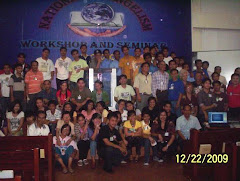 The preacher eagerly doing the job of preaching has certain challenges, opportunities and responsibilities. These I describe as peculiar; others call these extraordinary. They are a part and parcel of a preacher’s private life that makes him tick— his study life.
The preacher eagerly doing the job of preaching has certain challenges, opportunities and responsibilities. These I describe as peculiar; others call these extraordinary. They are a part and parcel of a preacher’s private life that makes him tick— his study life.The preacher must be a well that doesn’t run dry. It is an axiom that dry wells cannot give forth water. Brethren will long to come to free-flowing springs to have a drink. The fruit of much study comes out of a preacher’s mouth, but the seed of scholarly efforts must first be planted in his brain. We cannot teach what we have not imbibed.
In other words, a preacher must needs to have mental industry, or he would amount to any of the following: (1) Producing boring, haphazardly-done lessons in the category of the mediocre. (2) Calling on another preacher to save him— that is, to do the preaching for him. (3) Coming up with a false doctrine. (4) Falling short of the congregation’s expectations, he may resign his job.
Our skull is so arranged that it cannot be opened or unzipped or detached and tons of much readings deposited in it, like cash in a bank. The royal road to learning is still by learning the hard way, putting the brains to work by burning the midnight oil. The congregation’s second nature is to demand more of its preacher than of itself, so a preacher is a cut above his fellows. That includes the area of knowledge.
You may have often heard shallow, repetitive preaching. This is boring, tiresome and inexcusable. The preacher and the congregation he ministers to is no firmer and more edified than what he consumes and correspondingly feeds the congregation each God’s business day. God’s complaint about His people’s leaders in olden times (“My people are destroyed for lack of knowledge,” Hosea 4:6), is also an indictment against us in these modern times. A malnourished congregation is bound to become a driftwood.
The above observations simply emphasize the indispensability, importance and need of the preacher to be a serious student of the Word. Listen: even an inspired man must needs to find time to commune with his library no matter how meager. Go back to some scriptures where you find Paul in some lonely place in Europe and winter was fast approaching (2 Tim. 4:21), writing Timothy to come shortly (2 Tim. 4:9) and bring the cloak that he had left at Troas, as well as “the books, but especially the parchments” (2 Tim. 4:13).
The preacher is to study with proper attitudes, eagerly, purposely, and reverently. One Protestant scholar having read the whole Bible for years may pass off as a walking Biblical encyclopedia, but knowing the salvific truth of God’s teachings would have served him and humanity far better. Some preacher-theologians have majored on such shallow motives as searching for curiosity items, proof texts to win an argument, to sanction an already-espoused hobby, salve a wounded ego, or satisfy human pride. On the other hand, the preacher as a man of God studies the Word of God in order to learn, to obey, and to teach God’s will, delving into the divine tomes without prejudice, engaging in exegesis to find the truth “out of it,” not inject his “truth” into it. There is already a long queue of false teachers. Let’s find another line please.
Need we say that a preacher of God should seek to hold fast only to that which is good (1 Thessalonians 5:21), thoroughly searching and seeking to know the totality of the Bible’s teaching on any subject or theme (Acts 17:11-12; John 5:39) and with discriminating eyes finding the difference between aids and additions, custom and biblical tradition, dogmatism and common sense, literalism and figurativism, essentials and non-essentials, law and opinion, and a host of others? He is a man who makes the absolute biblical authority his guiding light. Seeking to be balanced in his study, he may find himself before an audience whose patience is not ever seeking, whose memory is a short as my Pentium 1. What he talks about takes into account each changing face and every changing aspect of life. The preacher’s great rewards will be if he experiences becoming more and more changed into the image of Jesus, with his preaching and his life becoming as fresh as the dew on summer mornings.
Recently I received the news of one young preacher who left. The reason given: “burnt out.” The task was so demanding he had fallen short of it. He’s not cut for the job. We and they who have trodden the difficult path to come to this point of our preaching career have only words of caution: The lives we live as preachers are not everyone’s cup of tea. As we have always said in conversations public and private, preachers are a different breed of men, and not everyone could be preachers.



































No comments:
Post a Comment